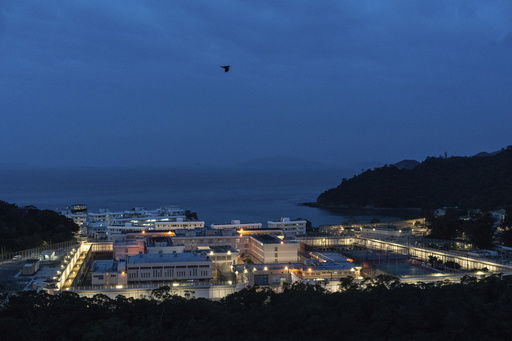Hong Kong’s new prison rules may curb lawyer and chaplain visits on national security grounds

By KANIS LEUNG
Associated Press
HONG KONG (AP) — Hong Kong tightened prison rules, allowing authorities to restrict visits, including those by certain lawyers and religious personnel, on national security grounds, in the latest expansion of its stringent control.
Under the new rules, effective Friday, magistrates can issue warrants on application by correctional service officers to bar exchanges between specific legal representatives and persons in custody if the judges believe such connections could harm national security or cause bodily harm to any person, among other reasons.
The department can also restrict certain visits, including those made by specific chaplains, for purposes such as maintaining national security, preventing crime and facilitating inmate rehabilitation.
Critics worry the changes could undermine inmate rights in a city where many democracy advocates were arrested for their political activism following massive anti-government protests in 2019. The city now has two national security laws that Beijing deemed necessary for stability.
Official data show hundreds of people were sent to correctional services facilities each year between 2020 and 2024 over offenses linked to the protests or for allegedly endangering national security. As of Dec. 31, 2024, nearly 600 people were in custody for such offenses, according to the correctional services department.
In a discussion of the changes with lawmakers this month, Hong Kong Secretary for Security Chris Tang said some prison visitors specifically went to see inmates who were jailed for their roles in “the black violence” — a phrase officials use to describe the 2019 protests — and they continued to stoke anger against the government. Tang said that was “no good” for safeguarding national security and detrimental to maintaining prison security.
The city’s government, without specifying, said a past incident in which an inmate handed over unauthorized articles to his legal adviser to take out of the prison during a visit has raised public concern. Last year, the city’s court system convicted jailed activist Owen Chow and his lawyer after the lawyer took Chow’s complaint form, concerning correctional service officers, out of prison without prior approval.
Officials maintained that when a magistrate issues a warrant to bar an inmate from consulting with a particular lawyer, the prisoner can still seek advice from another legal representative of their choice and be entitled to the right to confidential legal advice.
Lawmakers will scrutinize the legal changes next week.
Brandon Yau, secretary of the prisoner support group Waiting Bird, said it seemed some authorities believed former demonstrators of the 2019 protests were still planning organized resistance in jail, but that it doesn’t match reality.
Yau, whose group supports many people jailed for social movement-related cases, said those who provided humanitarian support to the inmates just wanted to show care for their well-being in prison and concern about whether they could start anew following their release.
“It seems they (authorities) are doing something further to create an atmosphere that they would continue to target and suppress the political prisoners who were convicted for their roles in the social movement,” he said.
While there’s no immediate impact on his group’s work, Yau said the law has granted powers to restrict inmates’ visitor lists, and they would have to see how extensively this power is being exercised.




